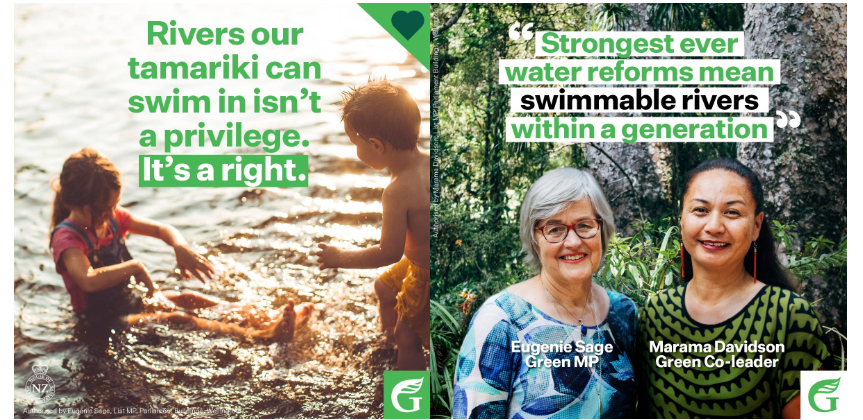By Elliot Hurst
The summer episode of the series “Reimagining, remembering, and reclaiming water: from extractivism to commoning” co-organized by the Undisciplined Environments and FLOWs blogs, explores swimming as a political act to reclaim social and ecological justice.
In Aotearoa New Zealand, shortly after arriving at the strategy gathering of a youth climate group, a friend and I make our way down the path to the beach. At a Young Greens summer camp we set up our tents beside a river, where we will swim at the end of each day’s program.
On the other side of the world, in Germany, I’m paddling between home-made houseboats on the Spree, while part of a water-based demonstration against the local coal power station. The Degrowth Summer School in Cerbere, in France, has lunch breaks just long enough to wander to one of the coastal coves for a midday swim. Listening to a band playing at a protest camp outside the Scottish parliament, the water feature is repurposed for dancing and swimming, in an upwelling of collective joy.
At each of these different moments and places, swimming is part of the process, a way to recharge after long discussions, a chance to play together.

Young Greens summer camp, Kauaeranga Valley. Author’s photo.
Paraphrasing Emma Goldman, activists have claimed dancing as a revolutionary necessity. I’d like to add swimming to my own list. Swimming can be re-politicised to create a profusion of swimming commons, that both embed the value of playful public abundance and nurture an ethic of more-than-human care.
Besides nurturing activist collectivities, what political work can the idea of swimming do? We could start with a story from Aotearoa New Zealand. Dairy intensification, draining of wetlands and deforestation have severely degraded the mauri (lifeforce) of waters. The hard work of campaigners made the deplorable state of rivers and lakes an election issue in the 2017 campaign. The National party led Government at the time signalled that they would tighten water quality standards, yet the proposed standards still left many rivers safe only for ‘non-contact recreation’.
At this juncture, the idea of swimmable rivers was a way to sharpen the contrast in ambition between the government and opposition parties.
The Labour party pledged to “make all rivers swimmable within a generation”, and the Green Party would “require all waterways to be safe for swimming”. The Māori Party was the most ambitious, with an aim to make all freshwater drinkable.

An NZ Green party election advertisement from 2017. Source: Green Party NZ
An NZ Green party election advertisement from 2017. Source: Green Party NZ
The concept of commons has a deep resonance here. By articulating a particular relationship between people and rivers, these rivers became commons whose health should be protected as part of the rights of all (and future generations). The idea that rivers should be safe for swimming is one that continues to appear in Greens messaging, even as the political realities of implementing improved water quality are sidetracked by agricultural interests. Against a backdrop of drying up rivers, harmful algal blooms and new irrigation dam projects, claiming instead that swimming was a right suggested an alternative future for the waters of Aotearoa. The ‘swimmable river’ emerged as a powerful political idea, as it turned debates of dairy intensification, nutrient limits and riparian planting into an issue where the right to enjoy a commons was at stake.

Recent Green Party NZ social media posts on swimming (tamariki is the Te Reo Māori term for children). Source: Green Party NZ facebook page
But claiming New Zealand rivers as commons is not something that can be uncritically celebrated. Ownership of lakes and rivers was never willingly given up by Indigenous (Māori) people. Hence, to claim that these water bodies belong to all New Zealanders, enacts a settler-colonial legal injustice. Ownership matters for water abstraction for urban supplies, storage in hydroelectric dams, fishing, as well for guardianship of the flows of matter (water, sediment, fertilisers, toxins) that tie a river to its watershed. It matters less for swimming, but that doesn’t mean that debates over swimming can be carried out in ignorance of colonial histories, and the priorities of indigenous people. I can’t say more here than the need to think of commons, rights and exclusions carefully, to avoid water colonialism.

The author in Lake Mapourika. Photo credit: Iryna Zamuruieva
The task of creating swimming commons also includes confronting hierarchies of race, gender, class and ability – to ask ‘who can swim?’. A particularly clear example is the political struggles of Muslim women in Grenoble, France, blocked from swimming in their preferred swimwear, and hence barred not only from swimming, but from being able to “accompany [their] children whenever they want to have a swim”. Equally, reflecting on my own research on wastewaterscapes in rural India, it is possible to read descriptions of village ponds that were ‘once clean enough to swim in’ as simply narratives of declining water quality. But to do so overlooks the basic point that young people in these villages today are lacking the opportunity to swim that previous generations (as well as wealthier urban residents) enjoyed, as a result of the pressures placed on these waterscapes.
Swimming is a good exercise in holding together the multiple meanings of water. Swimming is a playful activity. Following Donna Haraway, play helps us to rethink social action away from a binary of production and reproduction, to think of values outside of these logics. To me, this is encapsulated by kids swimming in irrigation canals on hot pre-monsoon days.
Swimming is play that might also be life-saving. Photos of the people swimming in the fountains of Paris were one of the defining images of the 2019 European heat wave, while fights broke out in the lines to public pools in England. As global heating accelerates, access to these refreshing swimming commons becomes vital.
Another detail that excites me about the idea of commoning for swimmable waters is the way that the caring practices of commoning can nurture more-than-human collectives. Swimmable rivers and coasts go hand-in-hand with restored populations of fish, thriving wetlands and an abundance of other life. Swimming ties human and ecological health together. Hence, the Rivers Trust in the UK marked World Rivers Day in October 2019 with a wish for “rivers fit to swim in”, noting that this goes together with abundance and flourishing for plants and wildlife. Many living beings (including swimmers) would benefit from efforts to fight the planetary-boundary busting nitrogen explosion, and all other pollutants pumped into swimming spaces. In contrast to private swimming pools (a justified target of urban political ecologists ire), thriving and healthy bodies of water are an ecological public abundance. Perhaps the ambition is that we swim with many other swimmers (fish, macrophytes and plankton, among others).
Modern water, as Jamie Linton describes, is a particular simplification of the multiplicity of waters on this watery Earth. These liquid flows are vital for urban metabolisms of drinking, washing and waste disposal. At the same time, the majority of human water use is directed to food production. The global water crisis (the focus of this blog series) is a concern about water supplies on both these fronts. And yet, there is more to water and waterscapes than this crisis. Fighting for and caring for more-than-human swimming commons links the water crisis to crises of biodiversity and global heating. The mixed-method and undisciplined skills of political ecology would be particularly well suited for exploring swimming commons: contextualising the measurement of water quality, developing grounded feminist political ecology accounts of bodily encounters with water, and critiquing the power relations that produce unhealthy water bodies.
Starting from the personal-political valence of swimming in my life, I’ve shown how thinking of water as a swimmable commons reveals struggles for social justice and ecological flourishing.
—
Elliot Hurst is a PhD scholar whose research investigates the lively socio-natural processes of wastewater infrastructure. He is currently based in Scotland, and calls Aotearoa New Zealand home. @elliotjchurst elliotjchurst.net






One Comment